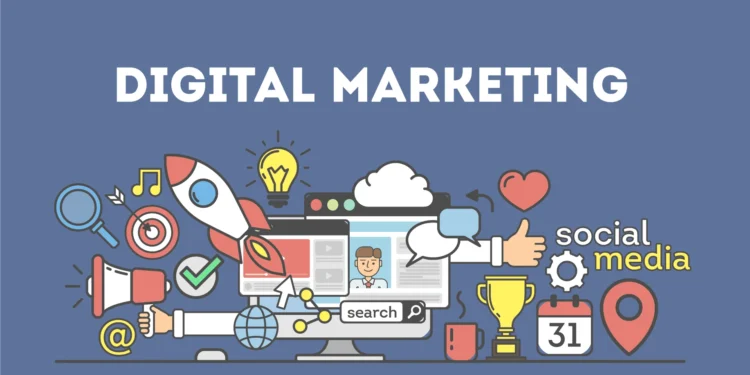In today’s competitive digital world, having a strong SEO and online marketing strategy is essential for businesses, bloggers, and marketers. With millions of websites competing for attention, it’s no longer enough to just create great content—you need the right tools to analyze data, optimize performance, track rankings, and automate marketing efforts.
SEO and online marketing tools help increase search engine rankings, drive traffic, improve conversions, and enhance brand visibility. Whether you’re working on keyword research, technical SEO, link building, PPC campaigns, content marketing, or social media growth, the right tools can make a significant impact on your success.
This article lists 60+ powerful SEO and marketing tools, categorized into groups based on their functionality. Each section will explain how these tools help businesses, entrepreneurs, and agencies grow their online presence, improve search performance, and boost marketing efficiency. Whether you’re a beginner or an experienced digital marketer, these tools will help you stay ahead of the competition and maximize your online potential.

Keyword Research Tools – Finding the Best Search Terms
Keyword research is the foundation of any SEO strategy. If you want your website to rank high in search results, you need to find the right keywords that your target audience is searching for. These tools help you identify high-traffic, low-competition keywords to optimize your content and attract the right visitors.
1. Google Keyword Planner
A free tool from Google that helps you find relevant keywords, check search volume, and analyze competition levels.
2. Ahrefs Keyword Explorer
Provides keyword difficulty scores, search volume, and competitor analysis, helping you find profitable keywords.
3. SEMrush Keyword Magic Tool
Generates thousands of keyword ideas, including long-tail keywords and competitor keyword analysis.
4. Ubersuggest
A user-friendly tool that offers keyword suggestions, search trends, and SEO difficulty scores.
5. Moz Keyword Explorer
Helps you discover long-tail keywords, analyze competition, and refine your keyword strategy.
6. KeywordTool.io
Uses autocomplete data from Google, YouTube, and Amazon to find unique keyword opportunities.
7. AnswerThePublic
Provides a visual map of search queries, helping you understand what users are asking online.
8. KWFinder
Finds low-competition, high-traffic keywords to improve organic and paid search rankings.
9. SpyFu
A powerful tool that allows you to analyze competitor keywords, PPC campaigns, and SEO strategies.
10. Wordtracker
Provides detailed keyword research and niche keyword suggestions for content marketing.
Why These Tools Matter:
Effective keyword research helps increase website visibility, attract the right audience, and improve rankings. These tools allow marketers to strategically choose the best keywords for content and advertising.

On-Page SEO Tools – Optimizing Your Website for Search Engines
On-page SEO involves optimizing website elements like content, metadata, URLs, and internal links to improve search engine rankings. These tools help ensure that your site is well-structured, user-friendly, and properly optimized for Google and other search engines.
11. Yoast SEO
A popular WordPress plugin that helps optimize content, meta descriptions, and keyword usage.
12. Rank Math
Offers advanced schema markup, keyword tracking, and SEO analysis for WordPress users.
13. Screaming Frog SEO Spider
A website crawler that detects SEO issues like broken links, duplicate content, and missing metadata.
14. Google Search Console
A free tool that provides website indexing data, traffic insights, and technical SEO fixes.
15. PageSpeed Insights
Analyzes website loading speed and provides recommendations to improve performance.
16. Surfer SEO
Uses AI-driven content analysis to improve SEO rankings and readability.
17. Sitebulb
An advanced SEO audit tool that detects site structure issues, page speed problems, and optimization gaps.
18. WebPageTest
Tests website performance from different locations and devices, helping marketers optimize for speed.
19. GTmetrix
Provides detailed performance analysis, including image optimization and script management.
20. Copyscape
Detects duplicate content and plagiarism issues, ensuring your content remains original and SEO-friendly.
Why These Tools Matter:
On-page SEO is crucial for higher search rankings, better user experience, and improved website performance. These tools help optimize pages, increase speed, and improve search engine visibility.

Backlink Analysis & Link Building Tools – Boosting Domain Authority
Backlinks play a significant role in SEO rankings and domain authority. The more high-quality backlinks your website has, the more trustworthy it appears to search engines. These tools help analyze backlinks, find link-building opportunities, and remove toxic links.
21. Ahrefs Site Explorer
A powerful tool that provides detailed backlink analysis and competitor link insights.
22. Moz Link Explorer
Allows you to track your backlink profile, measure domain authority, and find new link opportunities.
23. Majestic SEO
Offers Trust Flow and Citation Flow metrics, helping you assess backlink quality.
24. SEMrush Backlink Audit Tool
Detects toxic backlinks and helps you remove harmful links affecting rankings.
25. LinkMiner
Analyzes backlink strength, relevance, and authority, making it easier to find high-quality links.
26. BuzzStream
A link-building and outreach tool that helps you connect with influencers and bloggers.
27. Hunter.io
Finds email addresses for outreach campaigns, making link-building easier.
28. Monitor Backlinks
Tracks new and lost backlinks, helping marketers measure link-building success.
29. Pitchbox
An all-in-one tool for link-building outreach, influencer marketing, and email automation.
30. Google Disavow Tool
Helps webmasters remove low-quality backlinks that can negatively impact SEO.
Why These Tools Matter:
Backlinks improve domain authority, search engine rankings, and website credibility. These tools help businesses build high-quality links while avoiding harmful ones.

Content Marketing & Blogging Tools – Creating Engaging Content
Content marketing is at the heart of SEO and digital marketing strategies. These tools help generate content ideas, optimize writing, and create engaging, high-quality articles.
31. Grammarly
An AI-powered writing assistant that checks grammar, readability, and sentence structure.
32. Hemingway Editor
Helps simplify content by highlighting complex sentences and improving readability.
33. Clearscope
Optimizes content using AI-powered keyword recommendations and readability analysis.
34. Google Trends
Tracks search trends and popular topics, helping marketers create timely content.
35. CoSchedule Headline Analyzer
Evaluates headline effectiveness for better click-through rates.
36. Frase.io
Uses AI to generate SEO-friendly content based on search intent.
37. Quora
A platform to discover trending questions and content ideas.
38. BuzzSumo
Finds high-performing content ideas and trending topics.
39. Trello
Organizes content calendars and marketing campaigns in a simple drag-and-drop board.
40. WordPress
The most popular CMS for publishing and optimizing blog content.
Why These Tools Matter:
High-quality content helps attract organic traffic, engage users, and boost website authority. These tools simplify content creation and improve writing effectiveness.

Social Media Marketing Tools – Amplify Your Online Presence
Social media is a powerful tool for brand awareness, engagement, and customer retention. With billions of users on platforms like Facebook, Instagram, Twitter, LinkedIn, and TikTok, businesses need effective social media marketing strategies to reach their target audience. These tools help with scheduling posts, analyzing engagement, tracking performance, and managing multiple social media accounts from one place. Whether you’re a solo entrepreneur, a small business, or a large enterprise, these tools will help you maximize your social media presence.
41. Hootsuite
A social media management tool that allows you to schedule posts, track analytics, and manage multiple accounts in one dashboard.
42. Buffer
Helps businesses plan, schedule, and analyze their social media posts across multiple platforms.
43. Sprout Social
Provides social media analytics, audience insights, and engagement tracking to help brands optimize their campaigns.
44. Later
A visual content calendar that helps schedule Instagram, Facebook, Twitter, and Pinterest posts in advance.
45. SocialBee
An automation tool that categorizes content, recycles evergreen posts, and schedules posts efficiently.
46. MeetEdgar
Best for automating social media posting by repurposing and resharing old content.
47. Canva
A graphic design tool for creating stunning social media posts, infographics, and banners.
48. BuzzSumo
Helps users discover trending content, track competitors, and find influencers in their niche.
49. Sendible
A great tool for social media agencies, offering bulk scheduling, analytics, and client collaboration.
50. Iconosquare
A powerful tool for Instagram and Facebook analytics, tracking engagement rates and post performance.
Why These Tools Matter:
Social media is a crucial part of digital marketing, and these tools help manage campaigns efficiently, save time, track performance, and improve engagement. Businesses that leverage social media effectively can drive traffic to their website, build brand loyalty, and reach a global audience.

Pay-Per-Click (PPC) Advertising Tools – Optimize Your Ad Campaigns
PPC advertising is one of the fastest ways to generate traffic and leads. However, managing ad campaigns effectively requires data-driven insights, keyword targeting, audience segmentation, and budget optimization. The following tools help businesses run high-converting ad campaigns on Google Ads, Facebook Ads, and other paid platforms. They assist in finding profitable keywords, reducing wasted ad spend, and improving ROI.
51. Google Ads
The most popular PPC platform, allowing businesses to run paid search, display, and video ads on Google’s network.
52. Facebook Ads Manager
Helps advertisers create, manage, and track Facebook and Instagram ad campaigns for targeted marketing.
53. Microsoft Advertising (Bing Ads)
A PPC platform similar to Google Ads, targeting users on the Bing search network.
54. WordStream Advisor
An AI-driven tool that helps businesses optimize their Google and Facebook ad campaigns.
55. AdEspresso
Simplifies Facebook Ads by providing A/B testing, automation, and analytics to improve ad performance.
56. SE Ranking PPC Research Tool
Analyzes competitor PPC campaigns, keyword bids, and ad copies to help businesses create better campaigns.
57. Optmyzr
A PPC automation tool that analyzes campaign performance and suggests optimization techniques.
58. SpyFu PPC Competitor Analysis
Allows businesses to spy on competitors’ ad campaigns, see their keyword bids, and optimize their own strategy.
59. Adzooma
An AI-powered PPC optimization platform that helps advertisers reduce ad spend while improving results.
60. Google Optimize
A tool for A/B testing ad landing pages, ensuring higher conversion rates.
Why These Tools Matter:
PPC advertising can quickly drive traffic, but without proper tools, businesses waste money on irrelevant clicks and poorly optimized ads. These tools help reduce costs, improve ad targeting, and maximize returns on investment (ROI), making advertising more efficient and profitable.

Website Analytics & Performance Tracking Tools – Measure and Improve Your Strategy
Understanding how visitors interact with your website is key to optimizing performance and improving conversions. Analytics tools provide valuable insights into traffic sources, user behavior, bounce rates, and SEO performance. These tools help businesses and marketers make data-driven decisions, track marketing success, and refine their strategies.
61. Google Analytics
A must-have tool that provides detailed reports on website traffic, user behavior, and conversion tracking.
62. Google Tag Manager
Allows marketers to easily manage and track various website tags and scripts without coding.
63. Hotjar
Offers heatmaps, session recordings, and visitor insights to understand how users interact with your website.
64. Crazy Egg
Similar to Hotjar, this tool provides scroll maps, A/B testing, and conversion optimization suggestions.
65. Matomo (formerly Piwik)
A privacy-focused alternative to Google Analytics that provides in-depth user tracking and behavior insights.
66. Clicky
A real-time web analytics tool that allows instant monitoring of traffic and engagement metrics.
67. Kissmetrics
Focuses on customer behavior analytics, helping businesses track user journeys and conversion funnels.
68. Woopra
Offers detailed customer journey insights, real-time analytics, and automation for marketing strategies.
69. SE Ranking Website Audit
A powerful tool that helps identify website errors, SEO issues, and overall site health.
70. Google Data Studio
Transforms complex data into easy-to-read, interactive reports and dashboards for businesses.
Why These Tools Matter:
Without analytics, marketing is just guesswork. These tools help businesses track performance, identify weaknesses, and improve user experience. By analyzing real-time data and customer behavior, marketers can make informed decisions that boost engagement and increase conversions.

Email Marketing & Automation Tools – Build Strong Customer Relationships
Email marketing remains one of the most effective ways to engage with customers, nurture leads, and drive conversions. A well-crafted email campaign can significantly improve brand loyalty, increase sales, and provide a high return on investment (ROI). These email marketing tools help automate campaigns, personalize messaging, track engagement, and optimize email deliverability. Whether you’re running newsletters, promotional campaigns, or automated drip sequences, these tools will help you manage and scale your email marketing efforts.
71. Mailchimp
One of the most popular email marketing tools, Mailchimp provides automation, templates, audience segmentation, and analytics to improve engagement.
72. ConvertKit
Designed for bloggers, creators, and small businesses, ConvertKit offers automated email sequences, landing pages, and subscriber management.
73. ActiveCampaign
A powerful tool that combines email marketing, customer relationship management (CRM), and advanced automation to increase conversions.
74. Constant Contact
An easy-to-use platform for email marketing, social media promotions, and eCommerce automation.
75. Sendinblue
A feature-rich tool that includes email marketing, SMS campaigns, automation, and transactional emails.
76. GetResponse
Helps businesses create automated email funnels, landing pages, and webinar campaigns for lead generation.
77. AWeber
A trusted email marketing solution that provides email templates, list segmentation, and detailed performance tracking.
78. Drip
Ideal for eCommerce brands, Drip offers personalized email automation and behavior-based segmentation.
79. Moosend
A cost-effective email marketing tool with AI-driven automation, advanced analytics, and email personalization.
80. HubSpot Email Marketing
Part of HubSpot’s CRM, this tool helps marketers create personalized, automated email campaigns with deep customer insights.
Why These Tools Matter:
Email marketing continues to be one of the most cost-effective digital marketing strategies, delivering an average ROI of $42 for every $1 spent. These tools help businesses automate workflows, track campaign success, and send personalized messages that increase engagement and conversions
Digital marketing and SEO require a mix of creativity, strategy, and data-driven decisions. With so many tools available, marketers and businesses must choose the ones that align with their goals. Whether you’re optimizing a website, running ad campaigns, managing social media, or analyzing visitor behavior, the right tools can significantly enhance your efforts.
Using these 70+ powerful tools, you can:
✅ Discover high-ranking keywords and optimize your content for search engines.
✅ Improve website performance with speed tests and SEO audits.
✅ Build high-quality backlinks and strengthen domain authority.
✅ Automate social media posting and maximize engagement.
✅ Analyze competitor strategies and refine your approach.
✅ Run successful PPC campaigns and optimize ad spend.
✅ Track website analytics and improve conversion rates.
The digital marketing landscape is constantly evolving, and staying ahead requires leveraging the best technology available. By integrating these SEO and marketing tools into your workflow, you can streamline your processes, boost productivity, and achieve long-term online success.









